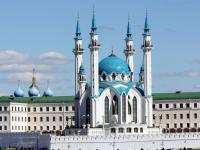Registration
You will receive an email confirming your registration.
IMGXYZ2451IMGZYXAs ruling elites seek to establish monopolies over the events of the 20th century, in large part to legitimize their own rule and nation-building projects, there is little tolerance for diversity of opinion, and control over “places of memory” threatens to erupt into international conflict.
History is being newly politicized in Russia and in the countries of Central and Eastern Europe and history itself is becoming a field of politics, but historians can and should resist manipulation by politicians. This idea was the dominant theme of the seminar “The Politics of History and Its Variations in Post-Socialist Countries,” which was held on March 5-6, 2010, in Kazan, as a joint project of the Carnegie Moscow Center and the Shigabuddin Mardzhani Institute of History of the Tatarstan Academy of Sciences. The seminar, which gathered participants from across the former socialist space, Western Europe and Israel, continued a discussion that had begun in the journal Pro et Contra, #3-4, 2009.
In comparing the politics of history of the countries of Central and Eastern Europe, participants argued that they have much in common, while differences in interpretations of history by various political powers are often dependent on their disparate understandings of the particularities of the legitimization of specific post-socialist countries. Alexey Miller, who launched the conference, underscored that, paradoxically, the politics of history of each country supports and justifies the politicization of history in other countries: politically tinged disputes arise that frequently grow into “history wars.” Following the logic of confrontation, historians begin to build their narratives of contradiction. An inflexible dichotomy arises: “us vs. them,” and “friends vs. enemies.” Furthermore, the various sides sweep under the carpet those facts that don’t fit neatly into this black and white picture. Such an approach to history undermines the space for dialogue. All at once, the possibility of finding general interpretations or compromises is lost, while contradictions are unnecessarily emphasized. Historians cease to be “objective observers and analysts” and are dragged into the political process. This makes their work and conclusions extremely fragile.
Fighting the propaganda machines within one or another national historical discourse is possible, Miller argued, but a significantly greater result can be achieved by renewing the dialogue between scholars of various countries in the region, who have fallen out of the habit of cross-border collaboration.
The seminar was moderated by Andrei Ryabov and Sam Greene.
